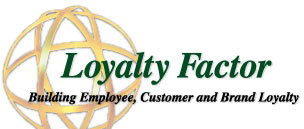Leadership is being the best you can be, and helping others be the best they can be.
Services News - Customer Loyalty Brings Big Business
Training business busier than ever in tough economic times
Services News
By Lynn G. Novak
NEW CASTLE, N.H. -Despite a business climate marked by economic downturn in 2001, Dianne Durkin, president of New Castle, N.H-based training and consulting firm Loyalty Factor says her company's revenues have more than doubled.
Since its formation in 1996, the 10-person organization has been training technical and customer support representatives how to best communicate with customers to increase satisfaction and boost loyalty.
Durkin says the recent economic landscape is a big reason her company is seeing significant growth.
"People recognize that they have to treat their customers better," says Durkin. "In the technology world, you've got to get those technology people to be able to communicate better because they are the ones that your customer trusts and they are the ones that are going to give the answers to your customers," she adds. "So we teach them neurolinguistic programming techniques."
Another reason her company has experienced significant growth is due to repeat customers as individuals who have experienced the training program change jobs from one company to another.
"The minute they get to the other company, then they hire us. They sell us to their management because they understand the value of it," she says.
Don Frye, manager of the technical support department and of the MIS team for Framingham, Mass.-based Process Software,p is one such manager.
Frye says his company turned to Loyalty Factor while working for a previous employer because the company wanted to learn more about how it could establish a better rapport with its customers.
Coming on board to head a department that is responsible for 70 percent of the business revenue with a target customer retention rate of 85 percent, Frye says his team needed to minimize the number of customer losses that result for reasons that within the teams control. His initial survey of customers showed that they were more unsatisfied with feeling left out of the process than the technical solutions or lack of technical solutions or length of technical solutions or time it took to get a technical solutions.
"Immediately, I looked back and said, 'This is what Loyalty Factor does. They help with customer retention and loyalty and they take it beyond just having a customer with a technical problems and providing them with a technical solution,'" he says.
While Process' support team underwent the training at the end of October and beginning of November, Frye says he has to admit that that almost instantaneously he began to see a drop off in the amount of complaints he received from customers waiting to get answers.
"We begin to understand the person on the other end and what they expect from us," says Frye. "Sometimes they don't expect us to call and say, 'I have the answer.' If we've promised them a call in a day or two, we call them and say, 'I haven't forgotten about you. I don't have the answer yet.' A lot of customers view that, when they look back at the experience, as being a lot more important than quickly coming up with a technical answer."



